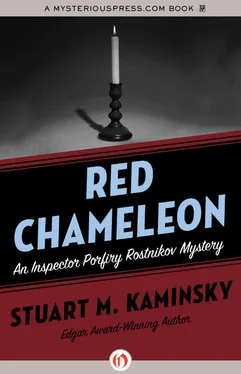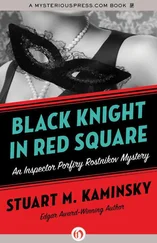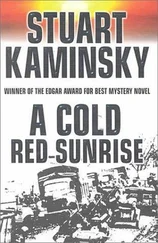Stuart Kaminsky - Red Chameleon
Здесь есть возможность читать онлайн «Stuart Kaminsky - Red Chameleon» весь текст электронной книги совершенно бесплатно (целиком полную версию без сокращений). В некоторых случаях можно слушать аудио, скачать через торрент в формате fb2 и присутствует краткое содержание. Год выпуска: 2012, ISBN: 2012, Издательство: MysteriousPress.com/Open Road, Жанр: Полицейский детектив, на английском языке. Описание произведения, (предисловие) а так же отзывы посетителей доступны на портале библиотеки ЛибКат.
- Название:Red Chameleon
- Автор:
- Издательство:MysteriousPress.com/Open Road
- Жанр:
- Год:2012
- ISBN:978-1-4532-6632-8
- Рейтинг книги:4 / 5. Голосов: 1
-
Избранное:Добавить в избранное
- Отзывы:
-
Ваша оценка:
- 80
- 1
- 2
- 3
- 4
- 5
Red Chameleon: краткое содержание, описание и аннотация
Предлагаем к чтению аннотацию, описание, краткое содержание или предисловие (зависит от того, что написал сам автор книги «Red Chameleon»). Если вы не нашли необходимую информацию о книге — напишите в комментариях, мы постараемся отыскать её.
Red Chameleon — читать онлайн бесплатно полную книгу (весь текст) целиком
Ниже представлен текст книги, разбитый по страницам. Система сохранения места последней прочитанной страницы, позволяет с удобством читать онлайн бесплатно книгу «Red Chameleon», без необходимости каждый раз заново искать на чём Вы остановились. Поставьте закладку, и сможете в любой момент перейти на страницу, на которой закончили чтение.
Интервал:
Закладка:
“Mr. Parker,” Martin said, glancing at Rostnikov. “I think-”
Posniky didn’t even bother to look at the man. He shook his head and held up a wrinkled hand to quiet him. And then he went on with his story, interrupted only by a waiter, who brought a fresh bottle of wine and some bread.
“The trees were thin in near spring, and they gave little protection in the light of day, so we had to walk deeper in the woods to be sure we weren’t seen from the road. When we heard a cart passing, we found shelter and waited. By early evening we had circled around a pair of small villages and watched a line of men on horseback heading in the direction from which we had come.
“‘They’re coming for us,’ Abraham said softly.
“‘No,’ I told him, rubbing my lower back and putting down his sack. ‘They are riding slowly and laughing.’
“‘Why are we still hiding in the woods instead of walking the roads?’
“‘We will take no chances until we are far away.’
“‘And how will we get on a boat at Riga? We have no money.’
“‘When we get to Riga’-I sighed-‘we will find the money.’
“‘God willing,’ said Abraham.
“A savage cold rain hit by evening, driving us under an outcrop of rocks where children had been before us, leaving a few torn books and pieces of glass. We shared the last of our cheese, drank rainwater from our clothes, and slept chilled. I remember dreaming of a town I had never seen, a town with no people, a town where rows of houses were being torn down. I had to run from house to house to stay ahead of the men and machines that moved forward to knock down the walls and send the dust of brick and mud into the air. I fled to a river and a long bridge that frightened me. I trembled and hesitated to put my foot on the white bridge, but behind me I heard the breathing of a sick cow, and I put my foot forward just as I woke up.
“We moved slowly, so slowly that our feet sometimes sank ankle-deep into mud in the woods and fields. The roads were a bit better, but we still avoided them. Sometimes we saw or heard someone working in a field, and one time we moved boldly through a nameless town and asked a ragged water carrier if we were on the right road to Riga.
“‘You’re on the right road, but you’ll both be old men by the time you walk there.’ The water carrier was a dry old man himself, a stick of a man, a kindling of a man with a brittle beard and no teeth. Very much like Abraham Savitskaya was in the bathtub when Martin and I found him.
“‘We haven’t any money,’ Abraham said.
“The old man opened his mouth to comment or laugh but said nothing. Instead, he held out his water bucket to us, and we took a drink. The street was cobbled, and three little children wearing sacks for clothes played near us, some game with sticks and a little ball. I thanked the old water carrier, and we hurried out of town and back off the road.
“After three days of travel, Abraham was shivering and estimated that we had gone no more than a tenth part of our journey at most. Even if we could keep up our present pace, it would be at least thirty days before we reached Riga, and Abraham, always fragile, could not keep it up for thirty days.
“‘We can go back,’ he said, sitting on a wet tree stump. ‘We could hide in the fields until we’re sure it’s safe.’
“I remember searching my sack for the last of our bread, finding it and tearing it in two for us.
“‘We killed two soldiers,’ I reminded him. ‘We will not be soon forgotten. And I don’t want to go back. You can go back if you want to.’
“We sat in the darkness, hugging ourselves, waiting for the night cold to take us. Abraham was first to give in to the chill and let it carry him to sleep, but I fought it, gritted my teeth, challenged until I felt I had proven myself and could allow my body the reward of rest. Before I slept, however, I planned.
“The next day’s travel was like the last, and we spoke little. The road turned, and we followed it, afraid that we had made a mistake and were now bound in the wrong direction, had somehow missed a turn and were headed into the vastness of an endless Russia toward Moscow; but the road gradually turned back in a direction I thought was north. Late in the brown afternoon we came to a large town and circled it. It took us an hour, and we never discovered the town’s name.
“‘We’ll wait here,’ I said. We were at the side of a road leading north from the town, and we sat in the woods about five hundred yards from the last house.
“‘I can go no further, Mikhail,’ Abraham said.
“‘We’ll go no further,’ I said, pulling my mother’s brass candlestick from his sack. I probably looked mad as the falling sun hit my face. Abraham backed away in fear and sat in silence.
“A few carts and wagons, and even an automobile, went by, away from the town, followed by a few people on foot, and then a rather elegant carriage went into the town. From behind a bush we watched them all as I held the brass candlestick tightly in the dark, dirty palm of my right hand. We looked at each other, two wild men, creatures of darkness, and in the midst of this meaninglessness I felt a power of nothing to lose.
“When the sun had almost disappeared across the wide field opposite us, a carriage clattered slowly from the town.
“‘Now,’ I said, rising, and Abraham rose, knowing what we would do without being told, transforming the deed into a ritual to allow us to do it, a pagan act born of despair as we two dark figures hurried forward, a brass candlestick in my hand, a stick in his.
“‘On the road,’ I said. ‘Stop the carriage. Even if you have to kill the horse. Stop the carriage.’ And I disappeared behind a ridge of low rocks.
“Abraham hurried forward, lumbered on legs turned stiff from sitting for hours, blood pumping to his throbbing head, probably thinking he might die before the deed was done, but he did not die. When the carriage with one horse turned the bend in the road, Abraham, a dark, spindly mantis, as much animal as man, stood in the road and frightened the gray horse. Had the driver urged him on, the horse would have run Abraham down and hurried into the coming night, but the driver, like the horse, was startled and stopped.
“The driver, a middle-aged man with a fine black coat and glasses, stood up and shouted something at Abraham, who reached up for the horse and held its muzzle. The angry man seemed frightened. I could see Abraham simply watch and wait as the man reached for something under the seat. Abraham strained his neck over the horse’s head as he petted it to see what the man was doing. When the gun came out, Abraham did not look afraid, only curious. He was not even afraid when the man raised the weapon in his direction and sputtered something. He did not become afraid even when he saw me work my way around from behind the carriage. The bullet and my swing of the candlestick came at the same time. The bullet leaped into the darkness above Abraham’s head, and he turned to watch it but saw nothing as the sudden night swallowed it. He had to pet and talk softly to the horse, whose eyes opened wide with fear at the sound of the struggle behind him.
“There was a rocking of the carriage and a terrible sound of something hard hitting bone, then a cry, not a cry really but a gasp that sounded like a child saying, ‘Why?’
“‘Hurry,’ I whispered. ‘Before someone comes by. Hurry.’
“Abraham hurried to the carriage and moved his head close to see the man, who lay slumped forward. Perhaps he expected blood, but could make nothing out in the darkness.
“‘Quick,’ I said, breathing quickly. ‘Let’s get him into the woods. Quick.’
“We lifted the man, and we could feel that he was still alive, though his right arm, the one that had held the gun, hung at an impossible angle, and we knew it was broken. When we had moved behind some rocks, we leaned over to listen to the man’s chest.
Читать дальшеИнтервал:
Закладка:
Похожие книги на «Red Chameleon»
Представляем Вашему вниманию похожие книги на «Red Chameleon» списком для выбора. Мы отобрали схожую по названию и смыслу литературу в надежде предоставить читателям больше вариантов отыскать новые, интересные, ещё непрочитанные произведения.
Обсуждение, отзывы о книге «Red Chameleon» и просто собственные мнения читателей. Оставьте ваши комментарии, напишите, что Вы думаете о произведении, его смысле или главных героях. Укажите что конкретно понравилось, а что нет, и почему Вы так считаете.












